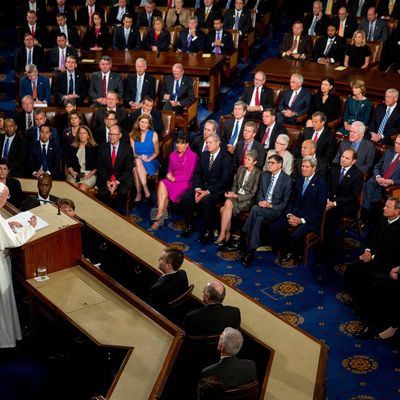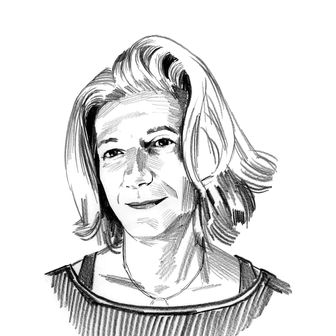
Thursday morning, Pope Francis vindicated just about everything gushingly good and adulatory that’s been said about him — around the world, but especially by American (and often atheistic or agnostic) liberals — since he ascended the papacy in 2013. I confess I’d been a little more on the fence about him, especially lately. By which I mean not sure what category of amazing to place him in. Is Francis just the best-possible modern representative of the ancient, sexist hierarchy that is the Roman Catholic Church, offering compelling, even inspiring, progressive sound-bites but not really altering the Church, policy-wise, especially when it came to the role of women? Or is he bigger than that? A transformational figure, a statesman whose political and rhetorical gifts are so profound that he is able to translate the Christian story, his story, in ways that feel both personal and universal and at the same time bracingly moral — so bracing that they feel impossible to dismiss as platitudes, no matter how platitudinous they are?
Francis’s speech to a joint session of Congress on Thursday put my waffling to rest (at least temporarily). I was exclaiming aloud as I watched him read from his prepared text; it did feel he was up to something unprecedented. But then I remembered the last time I felt so admiring of a rhetorical performance, a statesman’s ability to touch humans with ordinary language while at the same time urging them to reach for the highest versions of themselves — to care for neighbor as much as self. That was during Barack Obama’s first presidential campaign, back in 2008. Thursday morning, Pope Francis demonstrated an inspiring political genius, speaking in an exhortative language at once above the politicians he was addressing and immediately familiar to them. And yet quite a lot of what felt so earth-shaking about his speech, and his performance, he might well have learned from his host.
Let’s begin with the beginning. Like Obama, Francis is well versed in American identity and American dreams, and he invoked those shared dreams — name-tagging Abraham Lincoln, Martin Luther King Jr., and the Declaration of Independence — in his speech from the outset. He talked about “the land of the free and the home of the brave” (to a standing ovation on both sides of the aisle, a moment that might have been cheesy but was instead weirdly uplifting). He talked about “the many thousands of men and women who strive each day to do an honest day’s work, to bring home their daily bread, to save money, and — one step at a time — to build a better life for their families.”
And then, as Obama did with his own personal narrative (biracial; raised by a single mother; lost and then, finally, found; successful through his own grit, smarts, and determination), the pope in his white robes placed himself among us. I am an American, too, Francis said, privileged to be raised on “this great continent.” Not above or beyond, or apart from other people, Francis joined himself with the American story. And then — here’s the genius part — by partaking in American uniqueness, by aligning himself with it, he was able to shame his fellow Americans and, in particular, the sons and daughters of foreigners seated in that great chamber, for not doing enough to help bestow that dream upon others. As was the case with Obama in 2008, and occasionally still, to hear the rhetoric of shame in a political arena so often full of the language of villainy was … strangely animating. In a clear call to the nation’s politicians to address the refugee crisis abroad and resolve the immigrant crisis at home, Francis appealed to our — to his — sense of American-ness. “We, the people of this continent, are not fearful of foreigners because most of us were once foreigners,” he said. “If we want security, let us give security; if we want life, let us give life; if we want opportunities, let us provide opportunities.”
In his campaign speeches, Obama referred very frequently to the “least of these,” invoking the Christian mandate to look out especially to those who have less, who live on the margins, and this, too, is Francis’s call. And even though Francis is the head of a church and Obama was campaigning at the time to be head of a nation, they both frame politics as a vocation or a calling, and present the responsibility of politicians, therefore, as needing to be humane above all. Over and over, Francis insisted to the politicians in the room that they try to see the citizens of this nation, the people they represent, as individual humans with faces and lives, not just as poll numbers or tax receipts. In one hour, Francis tagged not just immigrants and refugees but the elderly, aimless youth, children, and the Earth itself as deserving of Congress’s generosity and compassion. He spoke directly to the death penalty and his belief that it should be abolished. “I offer encouragement,” he said, “to all those who are convinced that a just and necessary punishment must never exclude the dimension of hope and the goal of rehabilitation.” (Francis preceded his death-penalty remarks by talking about “our responsibility to protect and defend human life at every stage.” Many of the Republicans who started cheerfully applauding at this phrasing must have been surprised, in the moment, to hear the the Holy Father broach the subject of state-sponsored execution, and not abortion at all.)
Finally, there’s the Christian ideal of fraternity — a society of brothers and sisters who look out for one another even beyond, perhaps, what a family member might do. Obama talked about this frequently in the early days, referring to himself as “his brother’s keeper,” meaning that, in the Christian sense, a people committed to a single American ideal had to care for each other no matter what. And Francis reserved his most scathing remarks for the politicians in the room who seem to have misplaced this idealism, and whose highest aim instead is to protect what’s theirs. “There is another temptation which we must especially guard against,” he said. “The simple reductionism which sees only good or evil, the righteous or the sinners … To imitate the hatred and violence of tyrants and murderers is the best way to take their place.” This chastisement of gridlock, of shouting and vilifying, of not listening to one’s political enemies and calling each other names, was aimed not just at the chamber but at a whole population that seems at times to have forgotten what the sacred obligation of living in the most privileged place on this miraculous planet means. That to achieve the highest common good, people need to work together despite their differences — that justice for all only comes from a higher sense of solidarity and a unity of purpose. In another person’s hands, this exhortation to brotherly love (is it an accident that Francis’s last stop is Philadelphia?) might have seemed like a middle-school social-studies report or a Sunday-school lesson, but then again, much of the same could have been said about the president’s landmark speech on race in 2008. On Thursday, in the Pope’s hands, the message felt much more important, much more urgent — like straight-up wisdom and warnings from a man who might possibly be talking to God.






























